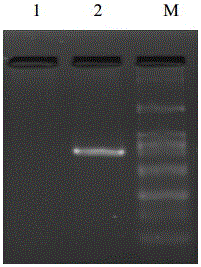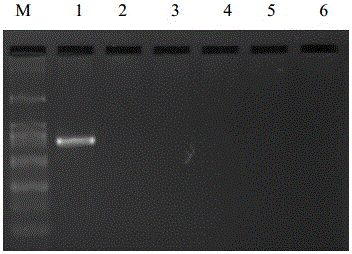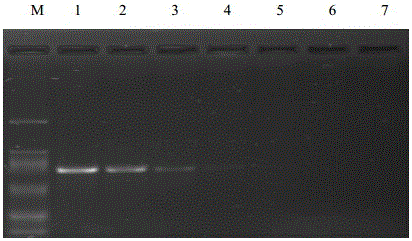Nasba amplification primers, kits and detection methods for detecting hop dwarf viroid
A technology for dwarfing viroids and hops, which is applied in the field of plant pathogen detection, can solve the problems of low viral RNA content, limited application and low repeatability, and achieves the effects of high sensitivity, low mismatch rate and low repeatability
- Summary
- Abstract
- Description
- Claims
- Application Information
AI Technical Summary
Problems solved by technology
Method used
Image
Examples
Embodiment 1
[0049] 1 material
[0050] 1.1 Viruses
[0051] Hop dwarf viroids include imported French grape rootstock seedling isolates, imported Italian grape seedling isolates, Xinjiang grape seedling and hop isolates, apple scar skid viroid (ASSVd), pear blister canker Pear Blister Canker Viroid (PBCVd), Peach latentmosaic viroid (PLMVd), Apple stem pitting virus (ASPV), Grapevine yellow speckle viroid-2 (Grapevine yellow speckle viroid, GYSVd-2) are kept by the applicant's laboratory.
[0052] 1.2 Reagents
[0053] Reverse transcription polymerase AMV, RNaseH, RNase inhibitor, T7 RNA polymerase, dNTP, ssRNAmarker, rNTP were all purchased from NEW ENGLAND BIOLAB; PCR amplification reagents, DNA markers, etc. were purchased from Beijing Tiangen Company;
[0054] 1.3 Primers
[0055] According to the full-length sequence of the hop dwarf viroid gene in the NCBI nucleic acid sequence database (accession number HM357802.1), the design NASBA reaction primers (NA-P1, NA-P2) with T7 prom...
Embodiment 2
[0067] Embodiment 2: specificity experiment
[0068] 1. Extract the RNA of hop dwarf virus, apple rust virus, pear blister canker virus, peach latent mosaic virus, apple stem pox virus, and grape macular virus-2, and use NASBA method for detection.
[0069] 2. Extraction of viral RNA
[0070] Take 0.1 g sample, grind it into powder with liquid nitrogen, transfer the ground material into a 1.5 mL centrifuge tube quickly, add 1 mL Trizol Reagent, mix by inversion, 2°C~8°C, 12000 g, centrifuge for 10 min. Take the supernatant, keep it at 15°C~30°C for 5min; add 0.2 mL of chloroform, shake vigorously by hand (do not vortex) for about 15s. 15°C~30°C, stand for 2min~3min; 2°C~8°C, 12000 g, centrifuge for 15min. Carefully pipette approximately 600 µL of the upper aqueous phase without disturbing the middle and lower phases. Add 500 μL of isopropanol to mix the supernatant, and place it at 15°C~30°C for 10min. 2°C~8°C, 12000g, centrifuge for 10min. Remove the supernatant, add 1 m...
Embodiment 3
[0079] Embodiment 3 Sensitivity experiment
[0080] 1. Use DEPC water to make a 10-fold gradient dilution of the hop dwarf viroid virus RNA template solution downwards, in order of 1×10 0 , 1×10 -1 , 1×10 -2 , 1×10-3 , 1×10 -4 , 1×10 -5 , 1×10 -6 , 1×10 -7 , 1×10 -8 μg / μL, each 2 μL was used as a template for NASBA amplification reaction.
[0081] 2. Extraction of viral RNA
[0082] Take 0.1 g sample, grind it into powder with liquid nitrogen, transfer the ground material into a 1.5 mL centrifuge tube quickly, add 1 mL Trizol Reagent, mix by inversion, 2°C~8°C, 12000 g, centrifuge for 10 min. Take the supernatant, keep it at 15°C~30°C for 5min; add 0.2 mL of chloroform, shake vigorously by hand (do not vortex) for about 15s. 15°C~30°C, stand for 2min~3min; 2°C~8°C, 12000 g, centrifuge for 15min. Carefully pipette approximately 600 µL of the upper aqueous phase without disturbing the middle and lower phases. Add 500 μL of isopropanol to mix the supernatant, and pl...
PUM
 Login to View More
Login to View More Abstract
Description
Claims
Application Information
 Login to View More
Login to View More - R&D
- Intellectual Property
- Life Sciences
- Materials
- Tech Scout
- Unparalleled Data Quality
- Higher Quality Content
- 60% Fewer Hallucinations
Browse by: Latest US Patents, China's latest patents, Technical Efficacy Thesaurus, Application Domain, Technology Topic, Popular Technical Reports.
© 2025 PatSnap. All rights reserved.Legal|Privacy policy|Modern Slavery Act Transparency Statement|Sitemap|About US| Contact US: help@patsnap.com



